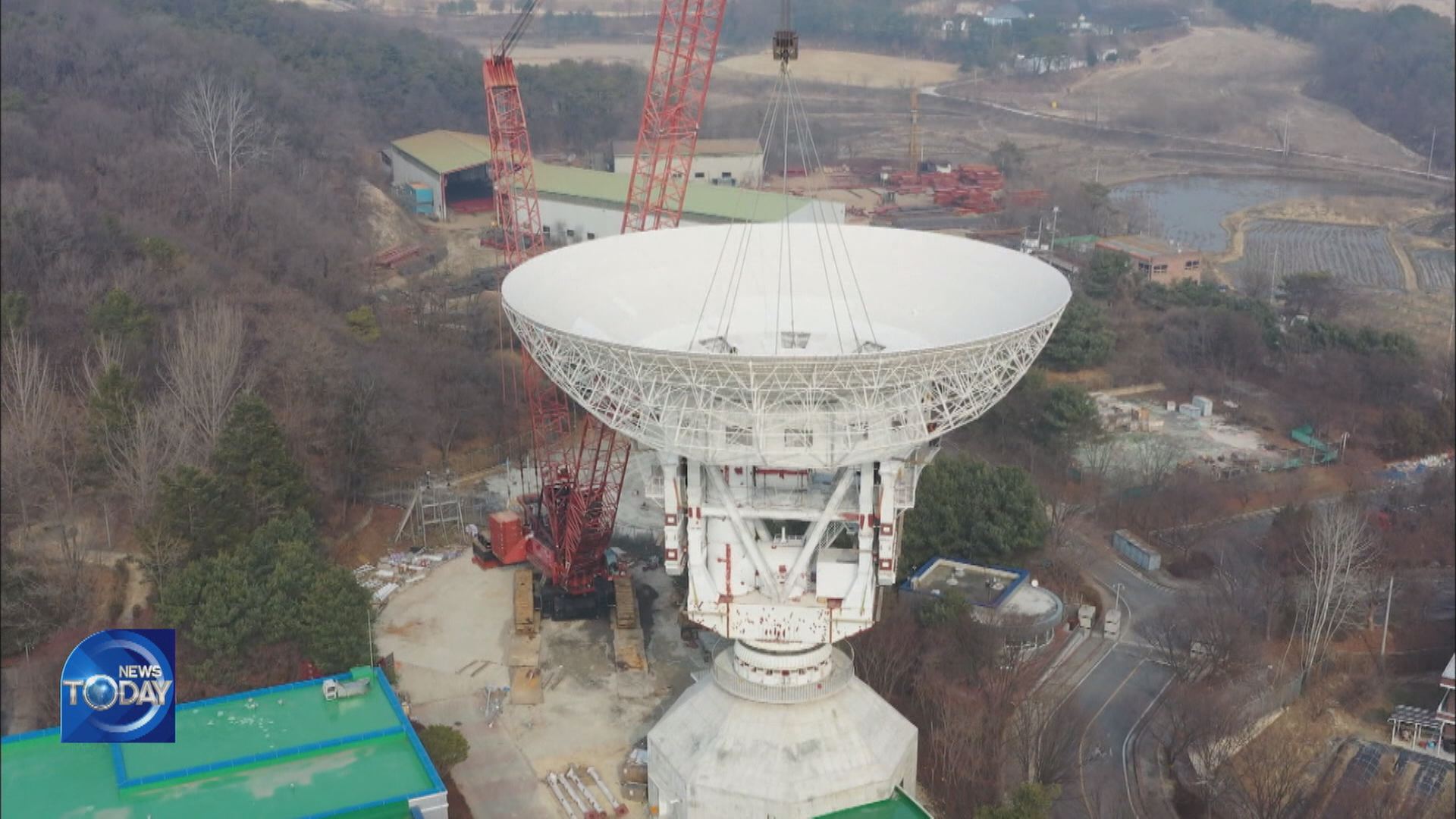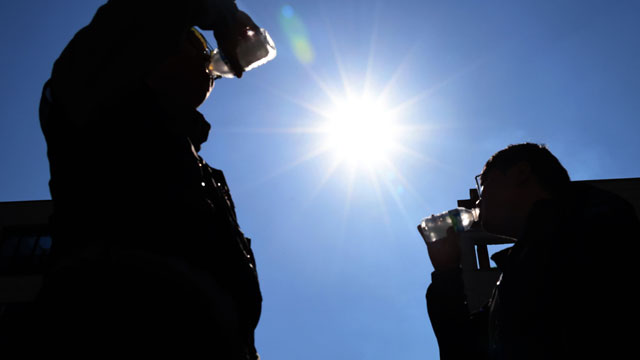S.KOREA'S DEVELOPMENT IN MOON EXPLORATION
입력 2020.12.15 (15:24)
수정 2020.12.15 (16:47)
읽어주기 기능은 크롬기반의
브라우저에서만 사용하실 수 있습니다.
[Anchor Lead]
Earlier this month, a Japanese space probe returned after successful completing its mission to collect soil samples from an asteroid. A Chinese space probe is also on its way back home from a mission to collect specimens from the moon. South Korea is also working hard to explore space on its own. We take look into how much progress the nation has made in the aerospace field.
[Pkg]
The nation’s largest round antenna reflector, which measures 35 meters in diameter, is placed on a pillar. The antenna will communicate with a satellite orbiting the moon. The lunar orbiter is over 384,000 kilometers away from Earth - ten times further than that of satellites moving around the planet. The construction of a space base station is expected to be completed in March 2022. The lunar orbiter will be equipped with six devices, including a magnetic field measurement instrument, a high-definition camera and equipment for a space Internet network. These three apparatuses have been completed. A gamma ray spectrometer will likely be completed before the end of this month, while NASA's mission to develop a shadowcam will come to an end by next June. The Korea Aerospace Research Institute will begin assembling the main body of the orbiter next month.
[Soundbite] KIM HYUNG-WAN(KOREA AEROSPACE RESEARCH INSTITUTE) : "We will check all possible flaws in advance by conducting a test on the installation layout."
Once completed, the lunar orbiter will be sent to space in the latter half of 2022 on a rocket developed by U.S. private aerospace company SpaceX.
[Soundbite] LEE SANG-RYUL(KOREA AEROSPACE RESEARCH INSTITUTE) : "Currently, we are making smooth progress with a plan to launch the orbiter some time between early August and early September of 2022."
Four months after its takeoff, the South Korean lunar orbiter will begin its one-year-mission of exploring the moon.
Earlier this month, a Japanese space probe returned after successful completing its mission to collect soil samples from an asteroid. A Chinese space probe is also on its way back home from a mission to collect specimens from the moon. South Korea is also working hard to explore space on its own. We take look into how much progress the nation has made in the aerospace field.
[Pkg]
The nation’s largest round antenna reflector, which measures 35 meters in diameter, is placed on a pillar. The antenna will communicate with a satellite orbiting the moon. The lunar orbiter is over 384,000 kilometers away from Earth - ten times further than that of satellites moving around the planet. The construction of a space base station is expected to be completed in March 2022. The lunar orbiter will be equipped with six devices, including a magnetic field measurement instrument, a high-definition camera and equipment for a space Internet network. These three apparatuses have been completed. A gamma ray spectrometer will likely be completed before the end of this month, while NASA's mission to develop a shadowcam will come to an end by next June. The Korea Aerospace Research Institute will begin assembling the main body of the orbiter next month.
[Soundbite] KIM HYUNG-WAN(KOREA AEROSPACE RESEARCH INSTITUTE) : "We will check all possible flaws in advance by conducting a test on the installation layout."
Once completed, the lunar orbiter will be sent to space in the latter half of 2022 on a rocket developed by U.S. private aerospace company SpaceX.
[Soundbite] LEE SANG-RYUL(KOREA AEROSPACE RESEARCH INSTITUTE) : "Currently, we are making smooth progress with a plan to launch the orbiter some time between early August and early September of 2022."
Four months after its takeoff, the South Korean lunar orbiter will begin its one-year-mission of exploring the moon.
■ 제보하기
▷ 카카오톡 : 'KBS제보' 검색, 채널 추가
▷ 전화 : 02-781-1234, 4444
▷ 이메일 : kbs1234@kbs.co.kr
▷ 유튜브, 네이버, 카카오에서도 KBS뉴스를 구독해주세요!
- S.KOREA'S DEVELOPMENT IN MOON EXPLORATION
-
- 입력 2020-12-15 15:24:02
- 수정2020-12-15 16:47:09

[Anchor Lead]
Earlier this month, a Japanese space probe returned after successful completing its mission to collect soil samples from an asteroid. A Chinese space probe is also on its way back home from a mission to collect specimens from the moon. South Korea is also working hard to explore space on its own. We take look into how much progress the nation has made in the aerospace field.
[Pkg]
The nation’s largest round antenna reflector, which measures 35 meters in diameter, is placed on a pillar. The antenna will communicate with a satellite orbiting the moon. The lunar orbiter is over 384,000 kilometers away from Earth - ten times further than that of satellites moving around the planet. The construction of a space base station is expected to be completed in March 2022. The lunar orbiter will be equipped with six devices, including a magnetic field measurement instrument, a high-definition camera and equipment for a space Internet network. These three apparatuses have been completed. A gamma ray spectrometer will likely be completed before the end of this month, while NASA's mission to develop a shadowcam will come to an end by next June. The Korea Aerospace Research Institute will begin assembling the main body of the orbiter next month.
[Soundbite] KIM HYUNG-WAN(KOREA AEROSPACE RESEARCH INSTITUTE) : "We will check all possible flaws in advance by conducting a test on the installation layout."
Once completed, the lunar orbiter will be sent to space in the latter half of 2022 on a rocket developed by U.S. private aerospace company SpaceX.
[Soundbite] LEE SANG-RYUL(KOREA AEROSPACE RESEARCH INSTITUTE) : "Currently, we are making smooth progress with a plan to launch the orbiter some time between early August and early September of 2022."
Four months after its takeoff, the South Korean lunar orbiter will begin its one-year-mission of exploring the moon.
Earlier this month, a Japanese space probe returned after successful completing its mission to collect soil samples from an asteroid. A Chinese space probe is also on its way back home from a mission to collect specimens from the moon. South Korea is also working hard to explore space on its own. We take look into how much progress the nation has made in the aerospace field.
[Pkg]
The nation’s largest round antenna reflector, which measures 35 meters in diameter, is placed on a pillar. The antenna will communicate with a satellite orbiting the moon. The lunar orbiter is over 384,000 kilometers away from Earth - ten times further than that of satellites moving around the planet. The construction of a space base station is expected to be completed in March 2022. The lunar orbiter will be equipped with six devices, including a magnetic field measurement instrument, a high-definition camera and equipment for a space Internet network. These three apparatuses have been completed. A gamma ray spectrometer will likely be completed before the end of this month, while NASA's mission to develop a shadowcam will come to an end by next June. The Korea Aerospace Research Institute will begin assembling the main body of the orbiter next month.
[Soundbite] KIM HYUNG-WAN(KOREA AEROSPACE RESEARCH INSTITUTE) : "We will check all possible flaws in advance by conducting a test on the installation layout."
Once completed, the lunar orbiter will be sent to space in the latter half of 2022 on a rocket developed by U.S. private aerospace company SpaceX.
[Soundbite] LEE SANG-RYUL(KOREA AEROSPACE RESEARCH INSTITUTE) : "Currently, we are making smooth progress with a plan to launch the orbiter some time between early August and early September of 2022."
Four months after its takeoff, the South Korean lunar orbiter will begin its one-year-mission of exploring the moon.
이 기사가 좋으셨다면
-
좋아요
0
-
응원해요
0
-
후속 원해요
0

















이 기사에 대한 의견을 남겨주세요.